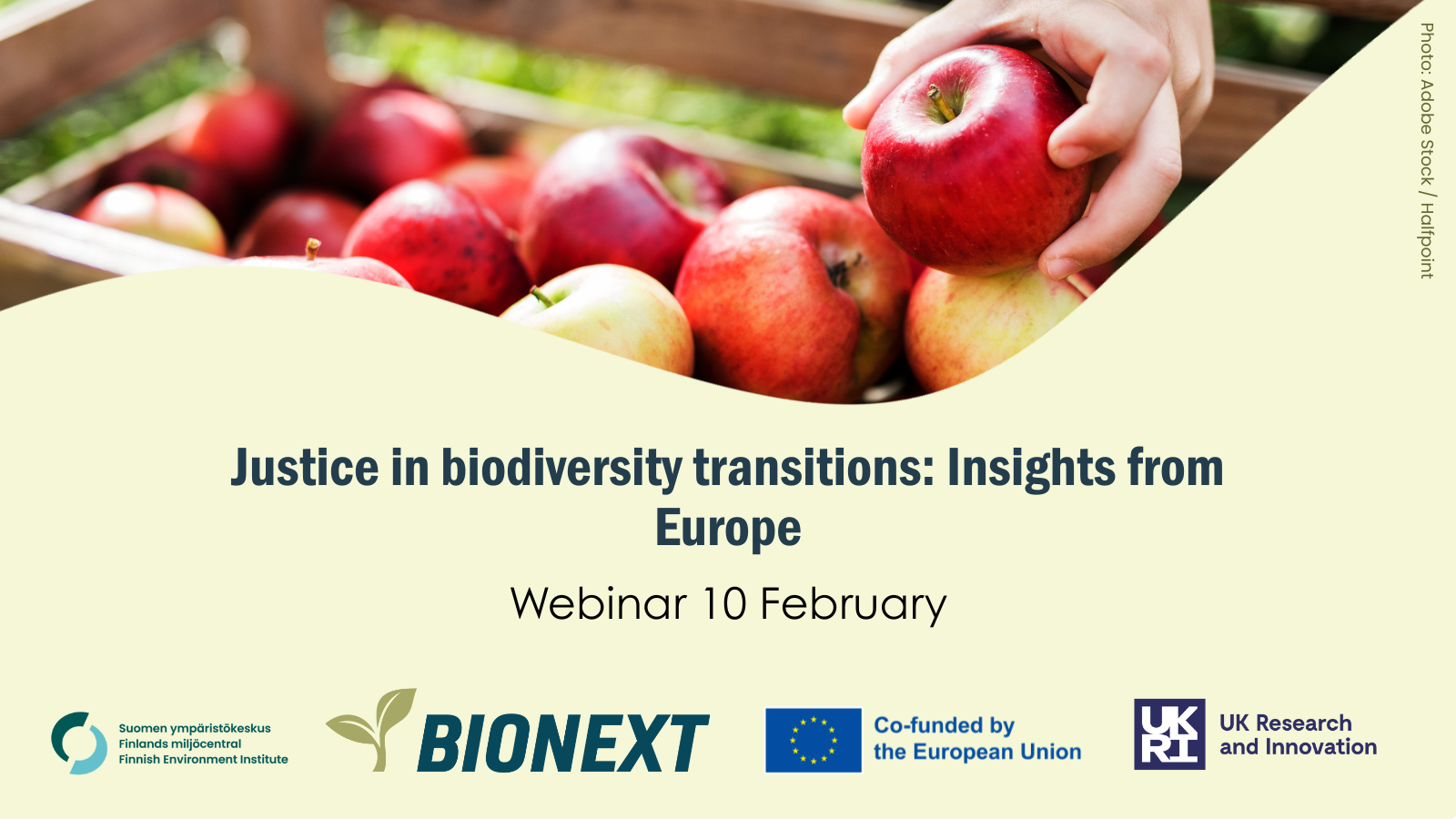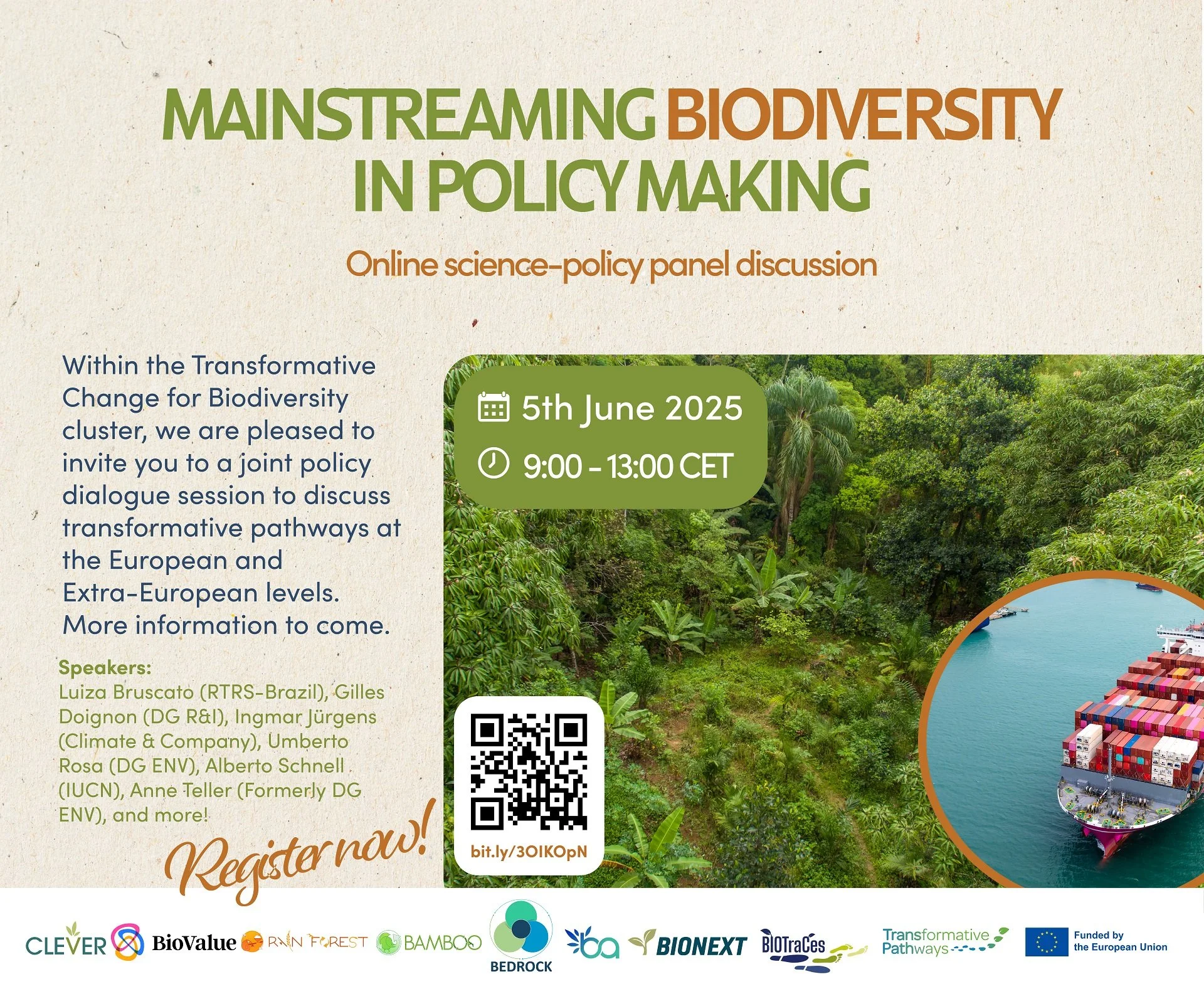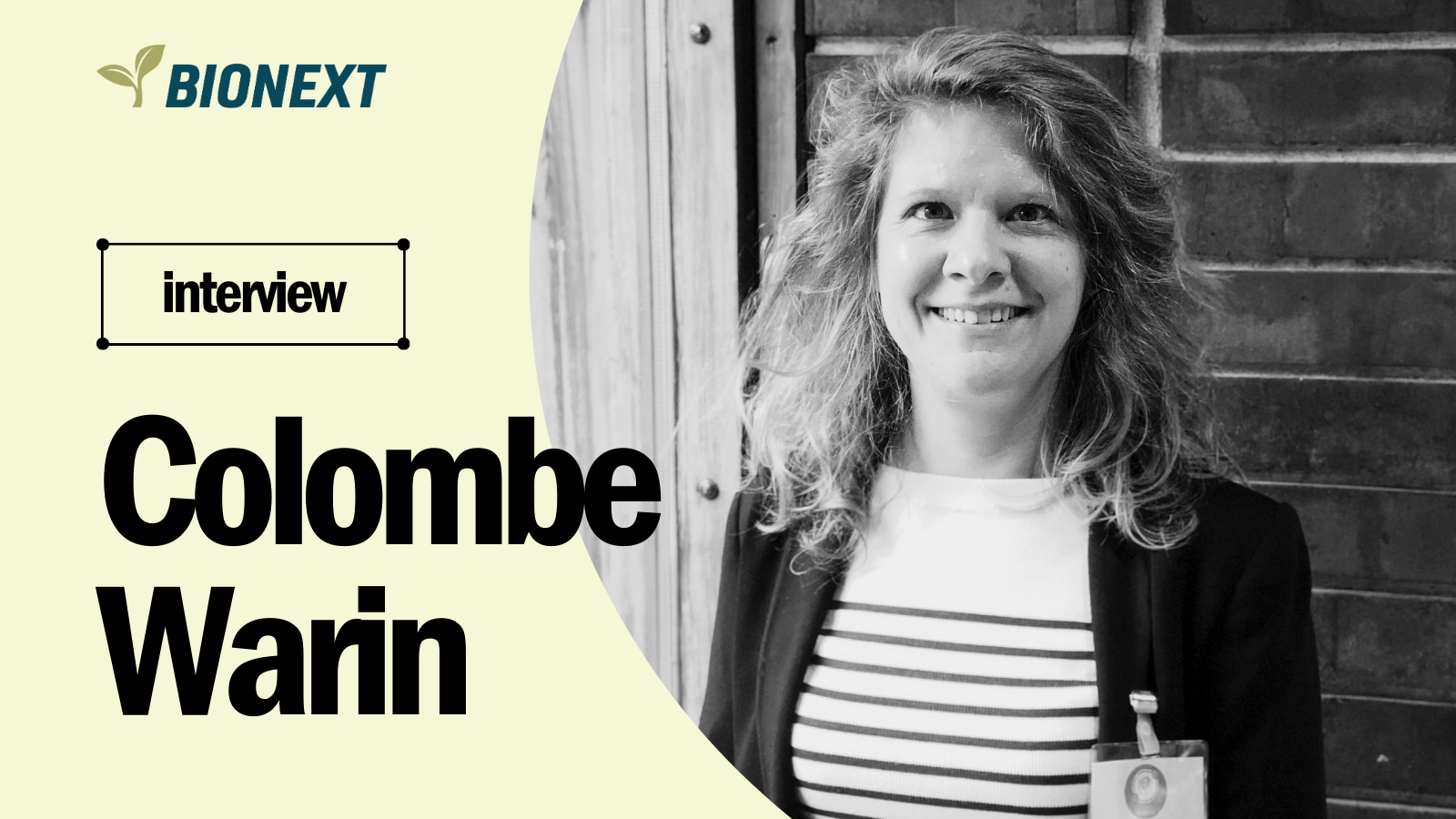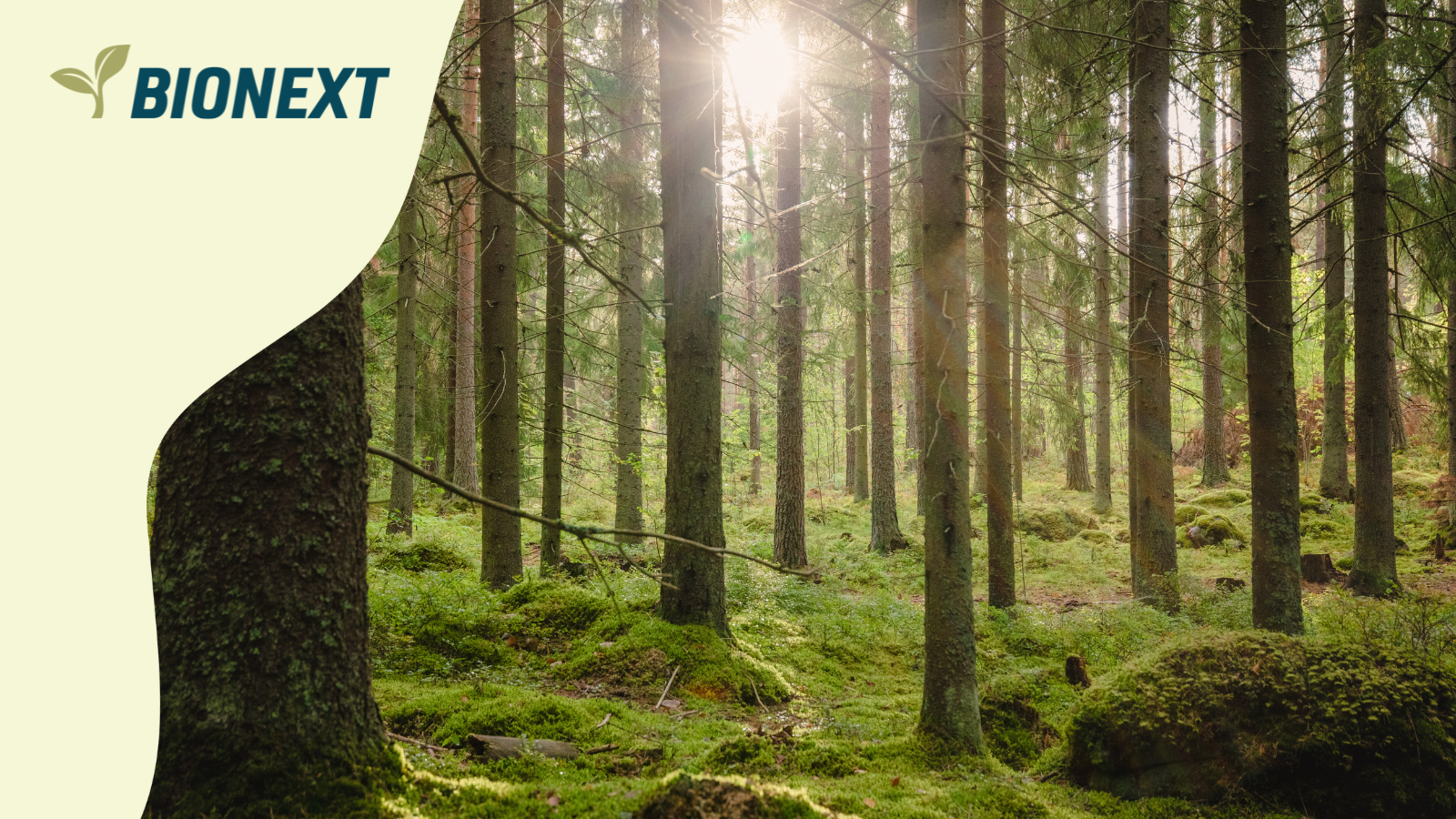

The Biodiversity Nexus: Transformative Change for Sustainability
BIONEXT is a research and innovation project that joins the fight for nature and biodiversity.
The project produces new evidence to better understand biodiversity loss and demonstrates how biodiversity underpins every aspect of life; the water we drink, the food we eat, and our health. To secure and protect these values, the project demands transformative change: BIONEXT’s goal is a sustainable society, where links between biodiversity, water, food, energy, transport, climate, and health are acknowledged and nature and biodiversity are a part of everyday choices and policymaking.
BIONEXT creates and offers science-based solutions and tools for reversing biodiversity loss and achieving regenerative, nature-centered futures and societies.

News
This webinar will explore how justice considerations play a role in efforts to change and improve biodiversity-related practices and policies in Europe.
The first two webinars of the BIONEXT project took place in autumn 2025, offering thought-provoking insights into the interlinkages between biodiversity and major societal systems, and introducing fresh policy recommendations from two research projects.
In December 2024, the Intergovernmental Science-Policy Platform on Biodiversity and Ecosystem Services (IPBES) released a groundbreaking scientific report called the Nexus Assessment that may change how the world tackles its greatest environmental and societal challenges. At its core, the report delivers one clear message: our crises are connected, and so must be our responses.
In this webinar, we will explore new research methodologies and fresh insights that reveal how nexus thinking can help design nature-positive futures.
In May 2025, the BIONEXT project held its third international workshop - this time in the spa town of Teplice in the Czech Republic, a region deeply shaped by both ecological degradation and the promise of renewal. This year's gathering focused on advancing transition pathways toward a nature-centered Europe.
International webinar to explore science-based insights and actionable policy recommendations for driving transformative change.
Under the Transformative Change for Biodiversity cluster, a group of Horizon Europe-funded project are pleased to announce an online event dedicated to biodiversity, to be held on June 5, 2025.
The health of humans, animals, plants, and ecosystems is deeply interconnected and mutually dependent. This idea is adopted within the "One Health" approach. But what is One Health and why should we care about it?
Halting and reversing biodiversity loss calls for ever more substantial efforts across the globe. There is broad consensus that transformative changes are needed. However, in the BIONEXT project we have learned that transformative change as a concept lacks concreteness. To deepen the understanding of the making of transformative change, we in the BIONEXT project have studied the options for change that evolve through bottom-up action.
To explore the role of businesses in combating biodiversity loss, we spoke with three experts – Martin Lok, Anna Chilton, and Katarzyna Dulko-Gaszyna – who are engaged in the business world, to hear their perspectives on the future and the vital role businesses play in shaping it.
The Intergovernmental Science-Policy Platform on Biodiversity and Ecosystem Services (IPBES) will publish two significant assessments in December. To assist media coverage, we are providing a list of IPBES authors available for interviews regarding the nexus assessment and its European perspective.
For 2 weeks in October, COP16 took over Cali. While it has been hailed as a “historic” “people’s” COP, many have criticised the summit for falling short on agreements on finance and monitoring. But what actually were the key decisions made at COP16, and what could they mean for transformative change?
The recently adopted European Union (EU) Nature Restoration Regulation is a new legislative development that represents the first time that legally binding EU-wide restoration targets and objectives have been set.
Today, we are witnessing an alarming decline in global biodiversity: more than a million species are threatened with extinction and many critical ecosystems destroyed or severely degraded. Global ecosystem collapse may be closer than we think if we fail to mitigate these trends. The implications would be far-reaching and catastrophic, extending beyond ecological concerns. So how does biodiversity loss affect our society?
A future where nature and society are thriving together, with biodiversity at the heart of our decisions shaping and governing society: how do we get there? And how can we trigger such transformative change?
To halt or reverse biodiversity loss, it is critical to understand the role of biodiversity in food production and consumption, water quality and availability, climate regulation and mitigation, human and ecosystem health, energy production and means of transportation.
Through an iterative process of knowledge co-production, we BIONEXT researchers collaborate with a diverse group of stakeholders in four workshops to design desirable futures and multiple just transition pathways.
With the global climate negotiations progressing, and countries now - for the first time ever! - being called on to transition away from fossil fuels in energy systems, the role of biodiversity in tackling the climate crisis is becoming more and more apparent. But how did the COP28 in Dubai reflect nature and biodiversity loss?
When discussing major challenges like biodiversity loss, climate change and social injustices, fixing each separately isn’t enough. We need to change how we deal with the natural world altogether – we need transformative change. But what exactly is this change and why is it crucial for our environment and us?
The European Commission funded the BIONEXT project with 4.1 million euros. We in the project asked the European Commission why the project was funded to shed light on the importance of the project. The answers were provided by our project officer Colombe Warin who works at the European Research Executive Agency (REA) as a project adviser.
We’ve read over 1,000 case studies related to biodiversity. Here’s what we’ve learnt so far.
2023 has so far been a year dominated by new climate records and extreme weather events such as extreme heat in southern Europe, flash floods in Hong Kong, Slovenia and Brazil, and the highest recorded global monthly average sea surface temperature in August (WMO, 2023). The list goes on.
Visiting Milan to join the 2023 European Business and Nature Summit (EBNS 2023), where frontrunning European businesses will discuss their action on nature, my first stop is the city’s cathedral. What a powerful masterpiece this is. Inspirational, not only for architects and tourists, but also for everyone who wants to learn how to reach the hearts of people.
Various catchy rules, such as the “3-30-300 rule”, or the “15-minute city” are becoming increasingly popular on how to green a city and allow easy access to green public spaces.
People and nature are interconnected in many ways. Our lives depend on nature’s goods and services, but our use of these resources has an impact on nature and its capacity to support us.
We’re bringing together and analyzing case studies of real-world projects and initiatives that have delivered, or attempted to deliver, transformative change for biodiversity.
We are seeking examples of projects or initiatives that address biodiversity along with at least one of the following elements: water, food, energy, transport, climate, and/or health. Read this blog and complete a short form to submit your examples.
Nature for society, nature as culture, or nature for nature – what will Europe look like in the year 2050? European changemakers are exploring a new set of visions for nature-centered Europe for 2050. In a May workshop in Greece, stakeholders created scenarios and visions of what a nature-centered Europe looks like in the year 2050. So, what were the results?
Close your eyes and imagine your ideal Europe in 2050. How would it look if we managed to achieve all that we have set out to do? What does Europe’s nature and society look like in this future?
The BIONEXT project is identifying pathways that help to achieve sustainable, nature-centered futures and societies. One key component of these pathways is the Pathways app, which will be based on good, real-world practices where biodiversity and nature have been the center of decision-making.
BIONEXT project in numbers

4 years

2022–2026

10 partners

8 countries

4.1 million euros
BIONEXT timeline
-
September 2022
The project starting
New research and innovation project BIONEXT creates novel science-based solutions and tools for halting biodiversity loss and achieving sustainable, nature-centered future and societies.
-
May 2023
1st workshop: visioning nature-centered Europe
In a May workshop in Greece, stakeholders from different backgrounds such as research, policy, activism, and businesses, created scenarios and visions of what a nature-centered Europe looks like in the year 2050.
-
October 2023
Collection of over 1,000 biodiversity case studies
We’ve collected a critical mass of case studies from around the globe, all indicating transformative change.
-
November 2023
Understanding and strengthening the concept of transformative change
Our researchers dug deep into this idea of transformative change and how it connects the biodiversity nexus. They reviewed 118 scientific papers focusing on transformative change created in scientific communities working on the nexus elements of water, food, energy, transport, biodiversity, climate and/or health. -
February 2024
Poilcy Brief
The results and recommendations from the project are now summarized in a policy brief!
-
April 2024
A review of the nexus interlinkages
The scientific paper on the review of nexus interlinkages reviews past and present interlinkages among climate change, water, food, energy, transport and health through their relationship with biodiversity and nature’s contributions to people.
-
May 2024
Report on final exploratory scenarios and desirable visions
The report on final exploratory scenarios and desirable visions clarifies the development of a set of exploratory scenarios covering a range of plausible futures for Europe that are likely to show both positive and negative impacts on biodiversity over the short (2030), medium (2050) and long-term (2100). The scenarios will include internally consistent projections of both indirect and direct drivers of biodiversity loss.
-
May 2024
2nd workshop: just transition pathways
In our second workshop with stakeholders, we formulate just transition pathways.
-
May 2025
Documents and databases for IPBES assessments
"Documents and databases for IPBES assessments are collected by engaging with the relevant bodies of IPBES at the global and national levels to identify a process and timeline for the provision of materials from the BIONEXT project,
specifically for the IPBES Assessments on the Nexus and Transformative Change. " -
May 2025
3rd workshop: Identifying additional actions to enrich the transition pathways
This workshop focuses on identifying additional actions to enrich the pathways (i) where vision elements are distant from achieving the desired outcomes; (ii) that avoid/minimise any likely trade-offs, or enhance any synergies/opportunities; and (iii) that are critical for unlocking the transformative capacity of the relevant actors who have agency in implementing the pathways.
-
August 2025
Multi-criteria decision-support module
The module provides practical guidance and best practices for applying MCDA methods and tools providing support for participating the stakeholders and for understanding the problem as a whole on the basis of structured learning of the other stakeholders’ preferences.
-
May 2026
Final workshop: synthesis of the project outputs and guidance to transformative change
The fourth workshop presents a synthesis of the project outputs, The BIONEXT Pathways App will be demonstrated to the potential users, and the draft Guidance to facilitate transformative change towards improved conservation and sustainable use of biodiversity and ecosystem services will be presented and discussed. The workshop brings together the methods and outcomes from the project into a set of building blocks that can be used by stakeholders to create their own just transition pathways specific to their geographic, social and cultural context.
-
August 2026
Pathways-app
BIONEXT develops a new and ground-breaking decision support tool in the form of a software application. The Pathways app allows diverse users to explore transformational building blocks. The building blocks can then be used to formulate policies, strategies, and implementation pathways.
































In December 2024, the Intergovernmental Science-Policy Platform on Biodiversity and Ecosystem Services (IPBES) released the Summary for Policymakers of its Nexus assessment. Now, the chapters that underpin the Summary for Policymakers have just been made publicly available. But what was it like to co-chair this landmark report?